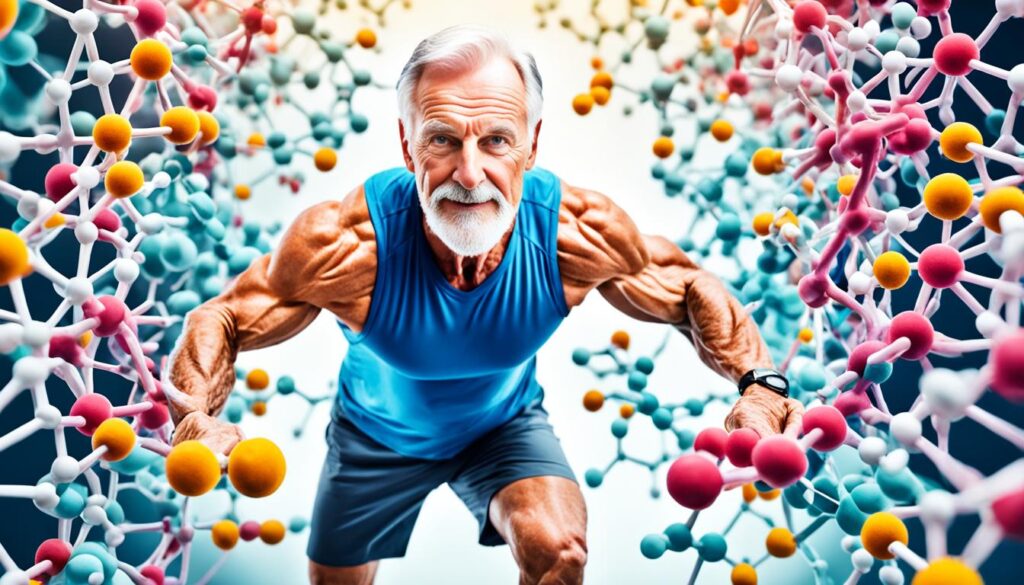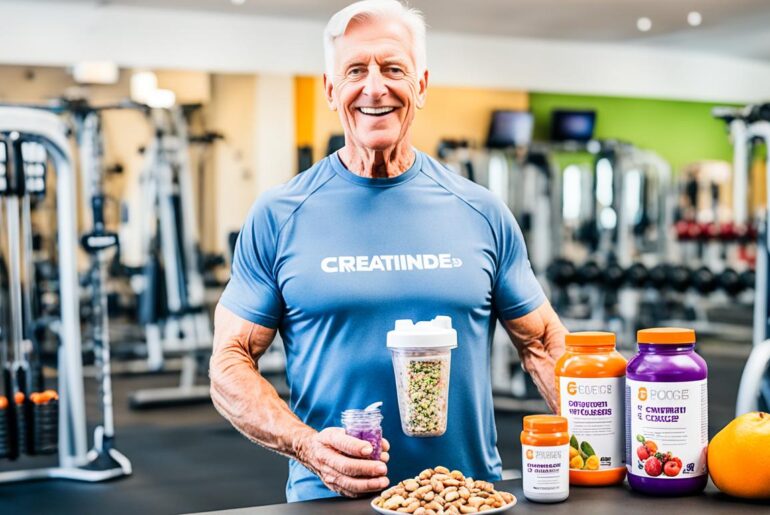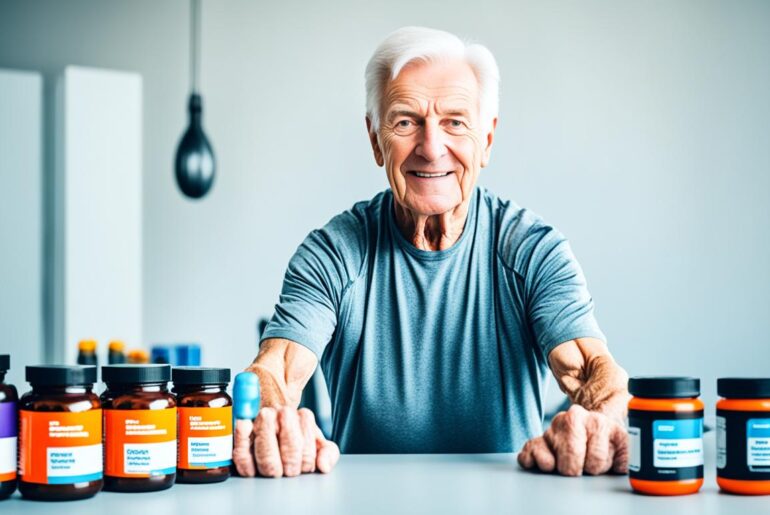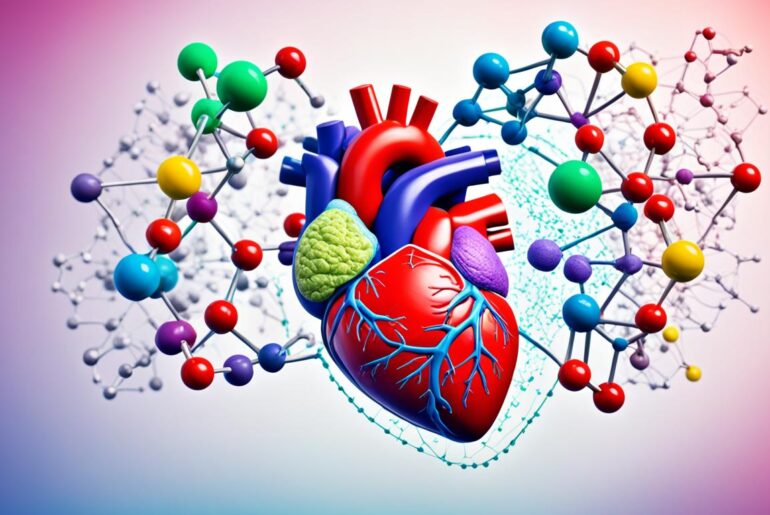Imagine extending your life’s healthiest years—not by mere days, but substantially by the equivalent of seven human years. This isn’t a fantasy; it’s a scientific possibility for seniors with the help of creatine supplementation. As I delve into the research, I’ve found that creatine—a supplement often associated with athletes—holds remarkable promise for aging adults. Beyond merely aiding muscle growth, creatine for healthy aging has shown potential in enhancing glucose tolerance, warding off cognitive decline, and defending against age-related diseases.
With a rise in interest regarding senior wellness and creatine, it’s becoming clear that this organic compound could be a game-changer for those seeking not just to add years to their life, but life to their years. The benefits of creatine supplements for seniors are making waves in the realms of gerontology and wellness alike, as we shift our focus from longevity to a concept perhaps even more valuable: healthspan.
Key Takeaways
- Creatine’s anti-aging effects could extend seniors’ healthspan significantly, by improving overall body functions.
- Creatine benefits for aging adults are not limited to muscle strength, but also include cognitive and cardiovascular health.
- Supplementing with creatine could help combat age-related muscle loss and assist in maintaining independence.
- Creatine plays a crucial role in sustaining mitochondrial function, thus providing energy to body cells and slowing aging.
- For seniors, the inclusion of creatine into the diet may support a heightened quality of life.
- Understanding proper creatine dosage and high-quality product selection is key for optimizing its effectiveness in seniors.
Understanding Creatine: More Than a Muscle Builder
When we talk about creatine, many immediately envision gym-goers and athletes seeking to enhance their physical performance. Yet, this natural compound plays multifaceted roles that go well beyond muscle strength and conditioning. As we delve deeper into the capabilities of creatine, we learn that it has a significant impact on cognitive health and creatine integration, with emerging importance in enhancing healthspan with creatine.
What is Creatine and How Does it Work?
Creatine is a pivotal player in the body’s energy system. It’s synthesized from amino acids and is paramount in tissues with high energy demands, such as the brain and muscles. By transforming into creatine phosphate, it donates a phosphate group to ADP, thereby regenerating ATP — the primary energy carrier in cells. This process is crucial for activities from quick, powerful muscle contractions to maintaining mental sharpness.
The Historical Context of Creatine’s Rise to Prominence
Historically, creatine gained attention for its performance-enhancing benefits among athletes. This supplement became synonymous with increased muscle mass and faster recovery post-exercise. Pioneers in sports nutrition helped creatine burst onto the fitness scene, transforming it into a household name for those looking to gain a competitive edge.
From Athletics to Aging: The Evolution of Creatine Supplementation
The narrative surrounding creatine is evolving. It’s no longer confined to the world of sports — now playing a vital role in creatine and longevity. Research illustrates how it supports mitochondrial function, the powerhouses of our cells, and how it could help in reducing cellular waste that accumulates with age. As we witness more adults striving for quality later years, the link between creatine and longevity becomes ever more critical.
Through my investigations and analysis, it’s become clear that the scope of creatine’s benefits extends well into the golden years of life, offering a beacon of hope for maintaining muscle function, mental clarity, and overall vitality.
Exploring the Anti-Aging Effects of Creatine on Cellular Health

As we delve into the discussion of how creatine can contribute to aging gracefully, we see its profound impact on cellular health. This is primarily due to its action on mitochondrial function and energy production, as well as its ability to reduce cellular waste and oxidative stress. Addressing these key areas can play a significant role in the anti-aging process at the cellular level.
Mitochondrial Function and Energy Production
Mitochondria are often referred to as the powerhouses of cells. They generate the energy cells need to function properly through a molecule called ATP (adenosine triphosphate). However, as we age, mitochondria can become less efficient, leading to decreased energy production and increased signs of aging. Creatine is known to enhance mitochondrial function, ensuring that energy production remains robust, which is essential for aging gracefully.
The Role of Creatine in Reducing Cellular Waste and Oxidative Stress
Oxidative stress is caused by an imbalance of free radicals and antioxidants in the body, which leads to damage and aging of cells. By decreasing oxidative stress, creatine can mitigate damage to vital components of the cell. Additionally, creatine helps reduce the buildup of cellular waste products like lipofuscin, a pigment that is often a hallmark of aging cells and tissue. Thus, the anti-aging effects of creatine support cellular health by keeping cells cleaner and more vibrant.
| Aspect of Cellular Health | Impact of Aging | Role of Creatine |
|---|---|---|
| ATP Production | Declines with age, reducing cellular energy | Boosts mitochondrial function, enhancing ATP |
| Oxidative Stress | Leads to cellular damage over time | Acts as an antioxidant, reducing cell damage |
| Cellular Waste | Accumulates and impedes cell function | Helps to reduce lipofuscin and other waste |
By acknowledging the anti-aging effects of creatine, specifically on influencing mitochondrial function and creatine’s role in protecting cells, we start to understand the full spectrum of creatine’s benefits. It’s not just an aid for athletes but a supplement promising grace in aging—a valuable tool for anyone aiming to maintain quality of life well into their later years.
Creatine’s Impact on Cognitive Decline and Neurodegenerative Diseases
As a professional copywriting journalist, I’ve delved into numerous health topics, but the exploration of cognitive health and creatine has yielded particularly fascinating insights. The substance most famed for its muscle-building prowess, creatine, now shines in the realm of neuroprotection. My research indicates that creatine’s role in neuroprotection is not just happenstance but is backed by scientific inquiry.
Creatine supplementation has emerged as a beacon of hope against cognitive decline often associated with aging and various neurodegenerative diseases. Through rigorous analysis and review of experimental models, findings point towards creatine’s potential to not just stall but also reverse certain aspects of cognitive diseases. This is momentous, considering the global impact of afflictions such as Alzheimer’s and Parkinson’s Disease.
Surprisingly, the benefits of creatine go beyond the usual expectations of energy enhancement. The compound exhibits an innate capacity to improve brain Adenosine Triphosphate (ATP) levels—essentially the energy currency of the cell. Additionally, it plays a role in reducing the accumulation of toxic proteins that contribute to the symptoms and progression of diseases like Alzheimer’s.
Leveraging the energy-enhancing effects of creatine, researchers have observed its utility in decreasing the levels of lipofuscin pigments. These pigments are byproducts of oxidative stress and are significant in their contribution to neuronal aging. Let’s consider a comparison between creatine and a placebo in terms of their impact on neurodegenerative disease markers:
| Treatment | Brain ATP Levels | Lipofuscin Accumulation | Toxic Protein Levels |
|---|---|---|---|
| Creatine | Increased | Decreased | Reduced |
| Placebo | No Change | No Change | No Change |
Crucially, these findings are not simply theoretical but have practical implications for those battling neurodegenerative conditions. For sufferers of Huntington’s, Parkinson’s, and ALS (Amyotrophic Lateral Sclerosis), creatine supplementation may offer a reprieve from the relentless progression of symptoms—establishing its stance as a multifaceted ally in cognitive health and disease mitigation.
It’s clear that the conversation surrounding creatine must expand beyond its connections to physical athleticism into the realms of mental endurance and longevity. As our society continues to age, the emphasis on cognitive well-being inevitably becomes more pronounced, and compounds like creatine stand at the forefront of this battle against time and degeneration.
Creatine’s Role in Muscle Maintenance and Strength for Seniors

As I delve into the importance of creatine for aging populations, I’m particularly drawn to its capacity to enhance muscle strength and contribute to the overall wellbeing of seniors. The issue at hand is not only about maintaining muscle mass; it’s about retaining vitality and the ability to lead an active lifestyle. The evidence suggesting that creatine benefits for aging adults are substantial continues to mount. Sarcopenia, the age-related decline in muscle mass, poses a daunting challenge, yet creatine emerges as a promising ally in the fight against this natural deterioration.
Countering Sarcopenia: Creatine’s Muscle Preserving Benefits
Sarcopenia is a fact of life for many seniors, but creatine’s role in mitigating its impact cannot be overstated. It’s not just about building muscle for the sake of aesthetics; we’re talking about preserving the very fibers that enable mobility and stability. With consistent creatine supplementation, the loss of muscle strength and mass can be countered, allowing a more robust and self-sufficient way of life.
Enhancing Muscle Recovery and Functionality in Aging Adults
Recovery is a crucial component of maintaining an active lifestyle as we age. It’s not enough to just exert and strain our muscles; how our body rebounds plays a pivotal role. Here, creatine shines brightly, aiding in the restoration of muscle functionality after exertion. This translates to decreased downtime and heightened ability to enjoy and engage in daily activities.
With the combined forces of resistance training and creatine supplementation, seniors can experience a notable improvement in their physical performance. The benefits of such a regimented approach to wellness are clear: an enlivened spirit and a body more capable of facing the challenges posed by aging.
| Benefits of Creatine Supplementation | Impact on Senior Health |
|---|---|
| Increased Muscle Mass | Counters the effects of sarcopenia and promotes better support for skeletal structure |
| Enhanced Muscle Strength | Facilitates daily tasks and reduces risk of falls and injury |
| Improved Muscle Recovery | Enables more consistent physical activity and less downtime post-exertion |
| Synergy with Resistance Training | Optimizes muscle functionality, leading to increased independence and mobility |
In every capsule and scoop of creatine, there lies the potential for a transformative shift in how we understand aging. I see a future wherein muscle strength and creatine supplementation are synonymous with senior health, and this is not a distant reality but one that is attainable with current knowledge and resources.
The Link Between Creatine Use and Cardiovascular Health
As I delve deeper into the potential health benefits of creatine, it’s important to consider its impact on the cardiovascular system. Recent studies hint at a promising relationship between creatine and cardiovascular health, particularly in older populations who are most vulnerable to heart conditions. Bearing in mind my focus on delivering professional insights, let’s examine how creatine could influence heart function and overall circulatory wellness.
Addressing Congestive Heart Failure with Creatine
When it comes to congestive heart failure, a condition where the heart struggles to pump blood adequately, creatine supplementation may offer a beacon of hope. The idea that creatine’s impact on heart function can alleviate some symptoms of this debilitating disease leads to a richer understanding of creatine’s role beyond muscle fitness and into the realms of cardiac health.
Improvements in Circulatory Health and Blood Pressure
Additionally, creatine’s possible influence extends to general circulatory health and may play a role in managing blood pressure levels. Research suggests that creatine can improve vascular function and has been associated with healthier blood lipid profiles. Let’s break down the evidence in a comprehensive manner.
| Aspect of Cardiovascular Health | Effect of Creatine |
|---|---|
| Endothelial Function | Improvement in vasodilation and blood flow |
| Lipid Profile | Potential normalization of blood lipid levels |
| Blood Pressure | Shows promise in reducing hypertension risk |
| Heart Failure Symptoms | May help alleviate symptoms and enhance quality of life |
| Stroke Recovery | Linked with improved outcomes post-stroke |
Ultimately, these findings encourage a new perspective on creatine—not just as an aid for athletes, but as a component of a heart-healthy lifestyle, particularly for seniors aspiring to maintain cardiovascular fitness. Though more research is necessary to draw conclusive results, current data provides a glimpse of creatine’s potential in supporting the heart’s function and circulatory health in profound ways.
In conclusion, while the connection between creatine use and cardiovascular health is still under investigation, the initial indicators are promising. The exploratory journey of creatine from a muscle-building supplement to a possible cardiac ally underscores its versatility and the need for its consideration in a comprehensive senior health regimen.
Creatine’s Potential in Extending Healthspan for Seniors

Exploring the frontier of healthy aging, I’ve delved into the burgeoning research around Creatine as a vital component for extending healthspan among seniors. A promising ally against the inevitable ticking of our biological clocks, Creatine’s multifaceted role in maintaining and enhancing physiological functions is gaining recognition. From firmer muscle tone to sharper cognitive abilities, and a more resilient cardiovascular system, the ripple effects of creatine supplementation are indeed profound.
Central to my investigation is the question: How can seniors harness creatine for optimal aging? The answer seems to lie in the substance’s cellular magic. Creatine’s contribution to ATP generation—a fuel essential for cellular activities—means our body’s microscopic powerhouses, the mitochondria, can work more effectively. This boost is essential in tissues that succumb to age quicker, such as the brain and muscles.
But let’s pivot from the science and get practical. How does creatine translate to daily benefits for older adults? Anecdotal evidence and clinical data coalesce, painting a picture of enhanced vitality. Imagine the elderly not just living longer but actually enjoying those extra years with vigor—gardening with less fatigue, engaging in lively conversations, and walking or even running with grandkids without the pervasive fear of heart strain.
Below is a comparative illustration of seniors with and without creatine supplementation, evaluating three core areas of healthspan:
| Aspects of Healthspan | Without Creatine | With Creatine |
|---|---|---|
| Cognitive Function | Faster Decline | Slower Decline, Better Memory Retention |
| Muscle Strength | Accelerated Muscle Loss (Sarcopenia) | Improved Muscle Mass and Recovery |
| Cardiovascular Health | Potential for Increased Weakness | Better Circulatory and Heart Function |
In these later chapters of life, it seems increasingly clear that enrichment comes not just from experiences but from the biological capability to savor each moment. Hence, integrating creatine into the dietary regimen of our golden-aged populace can potentially shepherd in a new era of healthy aging, where longevity is defined not by years alone, but by the quality and zest of those extra years granted.
Recommended Creatine Dosage and Supplementation Practices for Seniors

As I delve into the realm of creatine supplementation for older adults, it’s pivotal to establish a firm understanding of proper creatine dosage for seniors and the best practices in selecting creatine supplements. With myriad options on the market, choosing creatine supplements with confidence is key to achieving desired health outcomes.
Assessing the Optimal Creatine Intake for Safety and Efficacy
To set the stage for safety and efficacy, it’s generally recommended that seniors begin with a creatine dosage of 3-5 grams daily for general maintenance. This amount has been shown to support musculoskeletal health, which is crucial for reducing risks associated with falls and fractures—common concerns in older populations.
Remember, the most effective regimen for creatine supplementation practices involves consistency and attention to individual health needs and goals.
With safety as a priority, let’s take a moment to appreciate the robust safety profile of creatine. Numerous studies vouch for its low risk of adverse effects when consumed at recommended levels, making it a compelling addition to a senior’s nutritional strategy.
When I’m asked about choosing creatine supplements, my advice is always to lean towards reputable brands that provide high-quality creatine monohydrate. This form of creatine has garnered favor for its purity and effectiveness, making it a staple in many health-conscious seniors’ supplementation practices.
- Look for supplements that have been third-party tested for quality and purity.
- Opt for products labeled as ‘creatine monohydrate’ for reliable absorption and efficacy.
- Avoid supplements with unnecessary fillers or artificial additives.
And now, please take a look at this illustrative graphic which encapsulates the core topics discussed:
In summary, with the right creatine dosage for seniors and careful brand selection, older adults can confidently integrate creatine into their health and wellness routines. By following these guided supplementation practices, they can continue to thrive with vitality and strength well into their golden years.
Addressing Common Myths and Concerns About Creatine for Seniors
As a professional committed to senior wellness, I often encounter concerns about the safety of creatine supplementation in older adults. To ensure clarity and peace of mind, let’s examine the facts and dispel the myths surrounding creatine use for seniors. Both caregivers and seniors themselves can be assured that when it comes to creatine for senior wellness, evidence-based research is our guide. With awareness growing about the effectiveness of creatine for maintaining health during aging, it’s crucial to understand the truths behind common misconceptions.
Separating Facts from Fiction: Creatine’s Safety Profile
The narrative that creatine might compromise health is pervasive yet largely unsupported by scientific findings. Addressing the true creatine safety for seniors, numerous studies have highlighted its safe use in a variety of populations, including older adults. This natural compound, found in red meats and fish, has been rigorously tested and is considered safe when taken in recommended dosages. My commitment is to bring forth these findings, assuring that concerns are met with solid evidence, reassuring seniors and their families of the benign nature of creatine supplementation.
Debunking Concerns: Creatine’s Non-Impact on Renal and Hepatic Health
One particular area where misconceptions abound involves the impact of creatine on renal and hepatic health. I stand with the scientific community in dispelling the myth that creatine negatively affects kidney and liver function. In fact, creatine myths and facts often get tangled, but the reality remains that in healthy individuals, creatine has not been shown to harm these organs. This fosters a more informed dialogue about supplementation and enables seniors to consider incorporating creatine into their health regimen without undue worry about their renal or hepatic wellness.
Addressing Common Myths and Concerns About Creatine for Seniors
What is Creatine and How Does it Work?
Creatine is an organic compound that helps to supply energy to cells, particularly muscle cells, by increasing the formation of ATP (adenosine triphosphate), which serves as a key energy source for many cellular processes. It is naturally produced by the body and can also be obtained through diet and supplements.
The Historical Context of Creatine’s Rise to Prominence
Creatine gained notoriety in the early 1990s when it became popular among athletes for its ability to improve performance and increase muscle mass. Since then, its use has expanded to include a focus on health and longevity, particularly among seniors.
From Athletics to Aging: The Evolution of Creatine Supplementation
Initially utilized for athletic performance enhancement, creatine supplementation has evolved to combat age-related health issues. It is now recognized for its potential in supporting mitochondrial function, reducing cellular waste, and possibly delaying the onset of age-associated diseases.
Mitochondrial Function and Energy Production
Creatine plays a crucial role in enhancing mitochondrial function, which is vital for energy production in the body. By stimulating ATP synthesis, creatine helps maintain cellular energy supply, especially in energy-demanding tissues like muscles and the brain.
The Role of Creatine in Reducing Cellular Waste and Oxidative Stress
Creatine supplementation has been associated with reducing the accumulation of cellular waste, such as lipofuscin, and mitigating the effects of oxidative stress. These benefits support cellular health and may contribute to delaying the aging process at the molecular level.
How Does Creatine Affect Cognitive Health in Aging Adults?
Creatine supplementation is believed to have neuroprotective effects. It can enhance brain energy levels, potentially preventing or slowing cognitive decline. Moreover, creatine reduces the accumulation of harmful proteins and pigments, like lipofuscin, that are linked to neurodegenerative conditions.
Countering Sarcopenia: Creatine’s Muscle Preserving Benefits
Creatine has been shown to help maintain lean muscle mass and improve strength in seniors, acting as a possible intervention against sarcopenia – the age-related loss of muscle mass and function.
Enhancing Muscle Recovery and Functionality in Aging Adults
Creatine supports muscle recovery and functionality, which is critical in helping aging adults preserve their mobility and independence. When combined with resistance training, creatine can help improve overall physical performance in seniors.
Addressing Congestive Heart Failure with Creatine
Creatine has shown potential benefits in improving heart muscle strength and endurance, making it an aid in the management of congestive heart failure and other cardiovascular conditions.
Improvements in Circulatory Health and Blood Pressure
The use of creatine may contribute to better circulatory health and has been linked to improvements in blood pressure regulation. This suggests that creatine can play a role in supporting the cardiovascular system as adults age.
Assessing the Optimal Creatine Intake for Safety and Efficacy
While the optimal creatine dosage can vary depending on individual health goals and conditions, a standard dose of 3-5 grams per day is commonly recommended for maintenance purposes.
Seniors should look for high-quality creatine monohydrate supplements that are certified for purity and efficacy to ensure they are ingesting a safe and effective product.
Separating Facts from Fiction: Creatine’s Safety Profile
Creatine is considered safe for most people when used as directed. Misconceptions about safety can often be attributed to a lack of information or misunderstandings regarding its use and effects.
Debunking Concerns: Creatine’s Non-Impact on Renal and Hepatic Health
Scientific studies have found that creatine supplementation does not negatively impact kidney or liver function in healthy individuals. However, those with pre-existing renal conditions should consult with healthcare providers before starting supplementation.




